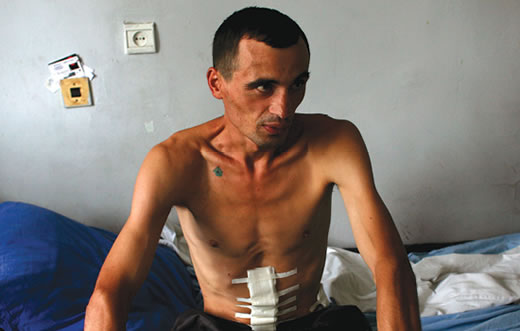Six thousand miles away from Emory, internist Ken Walker 56Ox 58C 63M was in the "other" Georgia—the former Soviet territory—when the bombing started in August 2008. Tensions with another region had escalated, and Georgia had begun exchanging fire with the breakaway region of South Ossetia and Russia. Staying in Tbilisi, Georgia's capital city, Walker watched as hundreds of casualties streamed into Central Republican Hospital.
Walker, deputy chief of medicine at Grady Hospital, would learn that the hard work of Emory physician faculty in Georgia had paid off. Only months before, 17 of Georgia's doctors had completed a mini-residency program in emergency medicine under the tutelage of Emory faculty. Until the group's graduation, the specialty of emergency medicine had been nonexistent in Georgia, a country of more than 4 million people. By the end of the Russo-Georgian conflict a few weeks later, the newly anointed emergency medicine doctors cared for hundreds of casualties with only a few deaths.
Georgia's new specialty of emergency medicine proved its usefulness. And Walker's project, which he named Partners for International Development (PfID), gained more momentum in its quest to transform health care in a developing country nine time zones away.
"Where's Tbilisi?"
The story of how Emory came to have a presence in Georgia goes back more than 20 years. It was 1992, less than a year after the fall of the Soviet Union, when a former Emory medical dean made a late-afternoon phone call to Walker.
"Do you want to go to Tbilisi?" the dean asked Walker with little preamble.
"Sure," Walker said. "Where's Tbilisi?"
The newly independent Georgia and its capital city, Tbilisi, were struggling economically amid social unrest. Despite a glut of doctors, health care was deteriorating, with basic supplies like thermometers available only sporadically. Nurses with only a high school level of education worked more like assistants than professionals in their own right.
Concerned that the health care of millions would spiral downward, the U.S. State Department created a program to match American hospitals and medical schools with their counterparts in the former Soviet Union.
Soon Walker and other Emory doctors from Grady Hospital and from Morehouse School of Medicine were flying to Georgia.
"Our charge was to identify one particular hospital and help it. We visited individual hospitals and medical schools. They had about 27 institutes—the institute of surgery, of trauma, of internal medicine," Walker says.
At the end of the trip, Walker made a decision: "I decided that the partnership needed to be with the country rather than with an individual hospital."
Over the next decade, Walker enlisted anyone he could to help with the effort. Countless Emory faculty and students from throughout health sciences found themselves conducting workshops on health care policy and administration, analyzing health outcomes, and helping Georgians lobby for health care reform. When faculty members saw that Georgian medical libraries were stocked with outdated resource guides in Russian, they developed a multimedia library equipped with computers and high-speed internet and a generator to ensure usability during daily electricity outages.
During the academic year, Georgian students received training in Emory's schools of medicine, nursing, and public health. In the summers, Emory medical, nursing, and public health students traveled to Georgia to conduct research studies. One Emory student analyzed the placenta blood of Georgia newborns and discovered significant thyroid deficiencies in more than 60% of the babies. The problem hadn't existed in Soviet times, and Emory doctors soon discovered why.
"It turned out that in the Soviet Union there was a salt factory that produced iodized salt," says Walker. "When the Soviet Union imploded, the factory rusted and stopped." Iodized salt stimulates thyroid functioning. Once the problem was discovered, Emory worked with Georgian public health officials to find a new supply.


